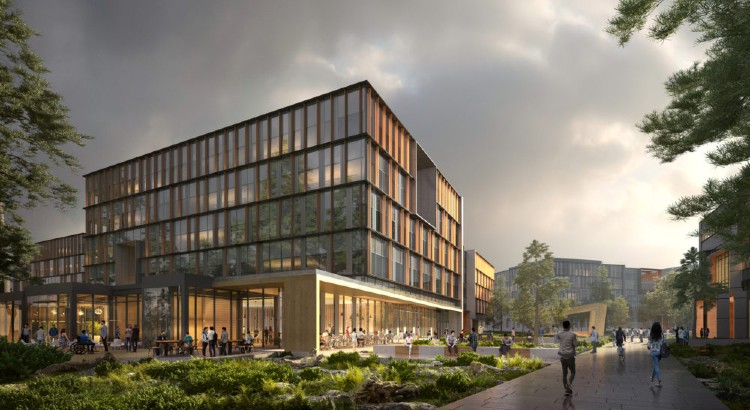Zero-carbon buildings really are thing.
Thirty-five buildings representing more than 8 million square feet of space have registered over the last two years for the International Living Future Institute’s Zero Carbon certification, ILFI Vice President James Connolly announced Thursday to the virtual Living Future 2020 conference.
That’s a faster uptake than other programs spun up recently by the Seattle-based nonprofit, and some of the projects that have signed up also are at a much larger scale. A 377,000-square-foot Google office in London recently became the first project to earn certification via the Zero Carbon, while a 17-building project across 72 acres on Microsoft’s Redmond, Wash., campus has moved into the construction phase.
On one hand, quick embrace of Zero Carbon reflects an aspect of the standard that’s less rigorous than other ILFI programs: Projects may offset their operational and embodied energy by contracting to obtain clean energy from offsite sources.
On the other hand, Zero Carbon is one of the few standards that require embodied carbon neutrality in construction and building materials (including offsets) — a target that until recently was nearly impossible to track, much less to achieve. (The other standards that require zero carbon also are operated by ILFI.)
In a workshop Thursday on the standard, ILFI Energy and Carbon Director Andrew Lee rattled off a bevy of advances that has led a handful of influential owners to finally embrace the goal.
“The building industry is starting to develop its own understanding and language for what zero carbon looks like,” he said. Last year’s roll out of the open-source Embodied Carbon in Construction Calculator followed an increasing integration of life-cycle assessment tools with building-information management systems. “This has changed the ability of teams to quickly understand their carbon profile.”
In addition, Lee pointed to the emerging “carbon-sequestering materials economy.” Businesses that produce carbon-storing products such as cross-laminated timber and straw-fiber boards are scaling up with massive new manufacturing plants. At the same time, a market is developing among real estate owners and developers who view tracking carbon as adding value to their portfolios.
Finally, Lee said, momentum has been building through the broader culture. Despite the Trump Administration’s withdrawal from the Paris Climate Accord, youthful advocates are demanding change, even as large investors begin to see the writing on the wall. He pointed to January’s announcement by BlackRock — the world’s largest investment fund — that it would back out of fossil fuel intensive industries and start to focus on sustainable investments.
Crisis and Hope
The virtual conference opened with a keynote speech by Living Building Challenge founder Jason F. McLennan, who professed his own “existential depression” over the lack of progress so far in combating climate change.
But McLennan pivoted toward the convention’s theme of “Sustaining Hope within Crisis.” That theme originally referred to climate change, but ILFI expanded it for the virtual conference to address the COVID-19 pandemic as well.
McLennan riffed on the idea with an optimistic prediction. The respite from normal hustle-bustle forced upon us by sheltering in place will turn 2020 into the “year of perfect vision,” during which human civilizations need and ability to respond to the climate crisis will become clearer, he argued.
“I feel, I believe that this is all a precursor to doing what needs to be done,” McLennan said.
Living Future 2020 continues today with a second keynote by Katharine Wilkinson, the Atlanta-based vice president of community and engagement for Project Drawdown. ILFI will provide an overview of regenerative projects that have attained the organization’s various certification, and two of the workshops will focus on tangible progress being made by two jurisdictions — Washington state and Boston — toward their own clean energy and carbon-neutral goals.
PHOTO AT TOP: Microsoft Redmond campus rendering. Courtesy Microsoft.


